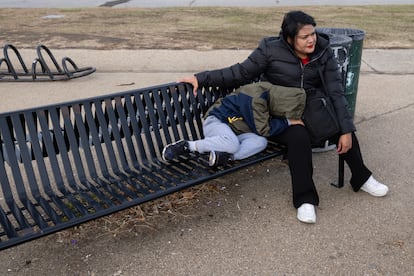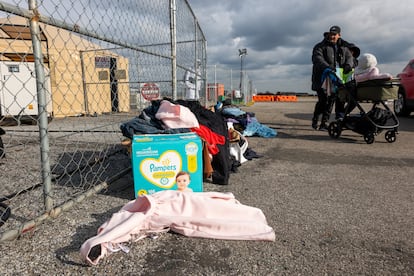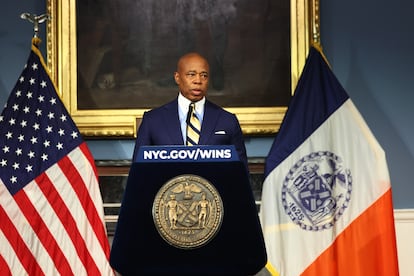Amid uncertainty and fear, thousands of migrants prepare for the closure of shelters in New York
Families at the Floyd Bennett Field camp, one of 25 centers that will shut down in the next two months, worry that the closure and relocation process will be disruptive for their children


Rosa Herrero has managed to make a new life for herself and her five children in the migrant shelter where they live. The single mother has done so despite the fact that the shelter is located in the middle of nowhere in Brooklyn, where the nearest subway station is nearly six miles away and the ride on public transportation to other points in New York City takes hours. She has also managed to do so despite the fact that her family sleeps on cots inside a giant tent that is part of a camp set up by the local government on a former airfield to house some 2,000 asylum seekers. It is far from a home, but it is the only roof the Herreros have had over their heads for the past year. Now, the city is evicting them from it.
New York City Mayor Eric Adams, a Democrat, announced last January 10 that his administration will close 25 migrant shelters over the next two months. Among them is the Floyd Bennett Field camp, where the Herrero family lives along with 500 others. This center is part of a network of 250 shelters set up by the city to accommodate the thousands of migrants who have arrived in the Big Apple since the spring of 2022. Since then, more than 225,000 asylum seekers have arrived, a record number. However, the number of new arrivals has been declining for five months, leading the Adams administration to reduce resources allocated to managing the migration crisis, including the closure of several shelters.
“Thanks to our smart management strategies, we’ve turned the corner,” Adams said in announcing the impending closure of 25 centers. “We’re going to continue looking for more sites to consolidate and close, and more opportunities to save taxpayer money, as we continue to successfully manage this response.” Over the past two years, Adams’ administration has allocated more than $6 billion to accommodate new arrivals.
In addition to the one at Floyd Bennett Field, which will close on January 15, the mayor plans to shutter the encampment on Randall’s Island, several hotels across the city, two Manhattan dormitories, and a warehouse-turned-shelter at John F. Kennedy International Airport, among others. Migrants living at those centers will be moved to other sites in the system, which is housing 54,900 migrants, down from a peak of 69,000 in January.
Affected families, meanwhile, say they have not received enough information about how the closure and relocation process will be carried out. Some migrants housed at Floyd Bennett Field — the city’s third-largest family shelter, which opened in November last year — say the closure notice took them completely by surprise. Families have been summoned to individual meetings at the reception and management center located at the Roosevelt Hotel in Manhattan, where they hope to find out where they will be living next month. The round trip from the camp to this hotel takes between four and five hours.
Herrero has her appointment next Friday. Sitting on a bench outside Floyd Bennett Field with two of her daughters, the 45-year-old single mother waits in the sun for the only public bus that passes near the camp. The wind from Jamaica Bay, which almost completely surrounds the shelter, whips her, while the temperature hovers around 2ºC. “I don’t know what I’m going to do,” laments the migrant from Venezuela, who arrived in New York a year ago. Since then, Herrero has lived with her five children — aged 9, 14, 15, 20, and 22 — in this shelter.

“I didn’t want to go anywhere else because I think about my children’s school, which is nearby, I think about my work, which is nearby, and their comfort and well-being,” she explains. Having to move to another center, possibly in another part of the immense city, worries her not only because of her job, but because the relocation will occur in the middle of the school year. “Psychologically, it’s not good for my children. They have already made friends and tried to adapt to that school. Moving them from one school to another also affects them,” she says.
This is precisely one of the main concerns of the city’s pro-immigrant organizations. Although they welcome the closure of this center, which they never considered suitable for accommodating families with children, they urge the Adams administration to do everything possible to ensure that the relocation process disrupts the lives of these families, and especially those of the minors, as little as possible.
“While we welcome this closure, one which we have long advocated for because this site was never an appropriate setting for families with children and raised concerns about families’ safety, we are mindful of the disruption it causes to the families we serve, who above all else are longing for stability. We also want to ensure that children’s learning continues, their access to the classroom is not impeded, and households can still reach employment opportunities, healthcare, and critical services,” migrant advocacy organizations the Coalition for the Homeless and the Legal Aid Society said in a joint statement.
Families will be moved from the center over the next few weeks until January 15, five days before Donald Trump returns to the White House and begins implementing his immigration agenda, which includes the detention and deportation of millions of migrants. Although Adams did not mention him when announcing the closure of the camp at Floyd Bennett Field, members of his administration, as well as migrant advocates, feared that the president-elect would launch raids at the shelter — since it is the only one in the city located on federal land — or cancel the lease.
Yet even with the shutdown, pro-immigrant organizations continue to keep an eye on the mayor for his outreach to the president-elect. Adams has already made clear that his administration will work with the incoming government on immigration issues, and the mayor met last week with Tom Homan, whom Trump has tasked with carrying out his promised mass deportation operation as his “border czar.” The two emerged from the meeting saying they had the “same goals.” In the face of this apparent alliance, groups like the Coalition for the Homeless and the Legal Aid Society say they are “closely monitoring” shelter closures and migrant transfers “to ensure new arrivals’ access to shelter and protection from any potential federal immigration enforcement dragnets.”

Access to home ownership: the pending task
The organizations also argue that rather than continuing to relocate migrants from center to center, the city should invest in long-term solutions that help these people obtain their own housing. The Adams administration implemented a new rule last May that requires migrant families housed in these shelters to reapply for shelter every 60 days, leaving them in an unstable situation in which, every two months, they run the risk of having to move if they are not granted a new spot in the same center. Meanwhile, couples without children and single people receive spots for only 30 days; after that period, they must leave the shelters unless the city determines that they have “extenuating circumstances” and grants them a waiver.
“While we welcome the news that the Floyd Bennett Field [center] will close, it is not enough. We urge the Adams administration to take further steps by focusing on humane and long term solutions that truly support our newest neighbors,” Murad Awawdeh, the president and CEO of the New York Immigration Coalition (NYIC), said in a statement. “The city must prioritize creating pathways to permanent housing that provide stability and dignity, ensuring immigrant New Yorkers can build their lives here and contribute to our communities.”
Herrero knows firsthand how difficult it is to find an apartment in the city as an asylum seeker. “I’ve been looking for a rental for five months to get out of here,” she says outside Floyd Bennett Field. She says she is building her credit, which is at 700 points (on a scale of 850), which is considered a “good” rating but not enough to get an apartment in a real estate market as competitive as New York’s. “I didn’t come to this country to be a burden on the government, but how am I going to rent if here they ask for a higher credit rating than I have? I have to continue being a burden on the government because they don’t give me the opportunity,” she says, frustrated.

“I have money to pay my rent, I have my money, and I work. But I’ve made 10, 20, or 30 applications to real estate agencies and when they see the documents they ask me for a higher credit score. Where am I supposed to get it if I have only been in the United States for a year and I just got my work permit?” she asks. Her budget for an apartment is up to $2,800. She is looking for a three-bedroom apartment for herself and her five children. “I’ve offered to give them three or four months’ rent in advance so they would see that I am a responsible person, and even then they won’t give it to me. So I see myself in the sad obligation of turning to the government because I have no other option, to stay in a place like this because there is no other situation that can resolve it for me,” she adds.
To address this reality, NYIC is demanding that Adams expand programs like CityFHEPS, under which beneficiaries residing in New York City receive a monthly supplement to pay their rent. Currently, undocumented migrants cannot benefit from this assistance. The organization believes that the program would help to ensure “success for all New Yorkers,” regardless of their immigration status, “rather than perpetuating a cycle of instability and hardship.”
Herrero is grateful that the city has provided her family with a bed over the past year, but she recognizes that it is not enough. “What I benefited from at the shelter, and what I am grateful for, was giving us a roof over our heads,” she says. “Everything else is up to me because it is my obligation as a single mother. And like me, there are many of us who work and look for a way to live with dignity, but they don’t give us the opportunity.”
Sign up for our weekly newsletter to get more English-language news coverage from EL PAÍS USA Edition
Tu suscripción se está usando en otro dispositivo
¿Quieres añadir otro usuario a tu suscripción?
Si continúas leyendo en este dispositivo, no se podrá leer en el otro.
FlechaTu suscripción se está usando en otro dispositivo y solo puedes acceder a EL PAÍS desde un dispositivo a la vez.
Si quieres compartir tu cuenta, cambia tu suscripción a la modalidad Premium, así podrás añadir otro usuario. Cada uno accederá con su propia cuenta de email, lo que os permitirá personalizar vuestra experiencia en EL PAÍS.
¿Tienes una suscripción de empresa? Accede aquí para contratar más cuentas.
En el caso de no saber quién está usando tu cuenta, te recomendamos cambiar tu contraseña aquí.
Si decides continuar compartiendo tu cuenta, este mensaje se mostrará en tu dispositivo y en el de la otra persona que está usando tu cuenta de forma indefinida, afectando a tu experiencia de lectura. Puedes consultar aquí los términos y condiciones de la suscripción digital.








































